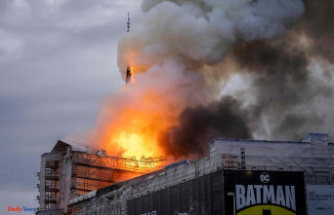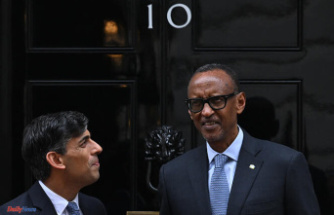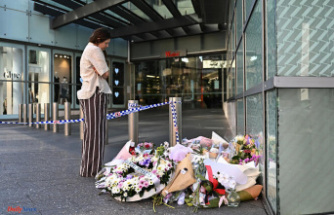Since the announcement of the justice reform project in early January, tens of thousands of Israelis have demonstrated every week to denounce it and criticize the government formed in December by Binyamin Netanyahu. The final approval of the judicial reform proposed by the Israeli prime minister and the ruling coalition was postponed until after Passover.
Alain Dieckhoff, director of the Center for International Research (Ceri) at Sciences Po, specialist in contemporary Israeli society, analyzes for Le Point the reasons for the opposition to the reform of justice.
Le Point: What does the justice reform plan proposed by Prime Minister Netanyahu and the ruling coalition consist of?
Alain Dieckhoff: This reform project, demanded for several years by the Likud [Israeli political party with a national liberal tendency classified on the right and led by Netanyahu, Editor's note], has several dimensions. On the one hand, it aims to limit the Supreme Court's power to review laws. To disqualify and retain as non-compliant an ordinary law, the judges of the Supreme Court would have to make a unanimous decision. Another element of the reform is that laws disqualified by the Supreme Court could be validated by the Knesset in the event of a new simple majority vote. It is obvious that this type of provision severely limits the power of review of the Supreme Court.
The other element is a new procedure for the appointment of judges in the various courts of the country. The judges would be appointed by a selection committee of nine people, but, unlike today, the committees would be made up of a majority of politicians, more numerous than lawyers, whereas today it is the reverse. Next, the reform provides that the role of legal advisers working with ministers would be limited. This would give ministers more autonomy of action and reduce the legal framework.
Finally, the power of the Supreme Court would be reduced in its ability to declare such and such a decision invalid: it could no longer assess the "reasonableness" or not of a decision. Recently, for example, the Supreme Court asked Netanyahu not to keep Arie Dery as interior and health minister because it was unreasonable to appoint him because of a conviction for fraud [he was subsequently dismissed from his post Ed].
And why is this project being contested?
The reform will limit the power of control of the Court both on legislation and on government decisions by giving more latitude of action to political power. In a country without a formal Constitution, where the Supreme Court is a sort of safeguard, the fear of those who oppose reform is to see executive power increase, particularly in a situation where the government coalition is very marked on the right with parties like that of the religious Zionists. The weakening of the power to control the actions carried out by an ultranationalist party seems worrying in the contemporary Israeli political landscape.
Could this project favor Prime Minister Netanyahu, who is currently on trial for corruption?
Yes, if the Court were to see its powers diminished, it could give more leeway to the Prime Minister and others in power. The Knesset could, for example, pass a law which would prevent legal proceedings against a person in office and thus give the last word to the parliament on questionable provisions. We would have "contingency laws" and that could endanger Israel's democratic foundations.
Are the current protests against judicial reform on an unprecedented scale?
It has been a very long time since there have been demonstrations bringing together so many people over a long period of time across the country, in all cities. This shows that there is real concern among the population, especially in the middle class and rather secular. It is a certain type of liberal Israel that has mobilized. Beyond the demonstrations, there were positions taken hostile to the reform project on the part of lawyers and then the mobilization of representatives of the economy, in particular in the dynamic sector of start-ups and more generally of business. .
The last straw that prompted Netanyahu to decree this temporary break was the mobilization of the reservists, that is to say those who must serve their reserve period [between one month and forty days every year until the quarantine, Editor's note]. When the reservists mobilized by displaying their concerns about the risk of transforming Israel into a country with a strong executive, and less tolerant vis-à-vis the political minority, the power was forced to react. No head of government can afford to ignore the reservists. If, in times of disorder, as in the current situation, they are called and they refuse to serve, it will throw the country into chaos.
Beyond the protests against the justice reform, do these demonstrations express a form of rejection of the current government?
Yes, the majority of protesters did not vote for the ruling coalition.
Does the risk of civil war mentioned by Netanyahu seem real to you?
No, I think we can speak today in Israel of a climate of civil discord. For now, the unrest has died down as the government pressed the pause button, but the Knesset will resume its work. The government has decided to move forward, perhaps having reached a compromise with the opposition, but this remains hypothetical. We will see in the coming weeks if they will reach a compromise.
Judicial reform is not popular with either the citizens or the ruling classes. Israel's consul in New York, Asaf Zamir, resigned: "I can no longer continue to represent this government. I believe it is my duty to ensure that Israel remains a beacon of democracy and freedom in the world,” he said. Can the broadcast denial from other Israelis, officials and scholars around the world help put pressure on the government and bring about change?
This reform has in fact not only led to the various mobilizations mentioned above, it has also raised concerns among senior civil servants. The police chief warned his minister Ben-Gvir, an extremist, that the police, too, must follow rules and cannot do anything when they intervene. It is quite inaudible for a minister like Ben-Gvir or other members of the government. Among senior civil servants, there are fears about the proper functioning of democracy and the rule of law. Ben-Gvir, on the contrary, before becoming minister, always supported the savage colonies by openly assuming very provocative and often contrary to the law attitudes. This leads to a situation in which some ministers like Ben-Gvir endanger the rule of law, when they should theoretically defend it while senior officials remind ministers that there are rules.
Could the adoption of the justice reform have consequences in the diplomatic relations between the United States and Israel?
There was a rather unprecedented and very direct warning from American President Biden, who indicated that he would not receive Netanyahu at the White House for the time being, very clearly mentioning in this decision the reform in progress. The adoption of the reform, without internal Israeli compromise, could therefore contribute to heightening tensions between the two countries.
Alain Dieckhoff is the author, among others, of Israel-Palestine: An Endless War? 22 Decisive Questions (Armand Colin) and The Invention of a Nation: Israel and Political Modernity (Gallimard)












